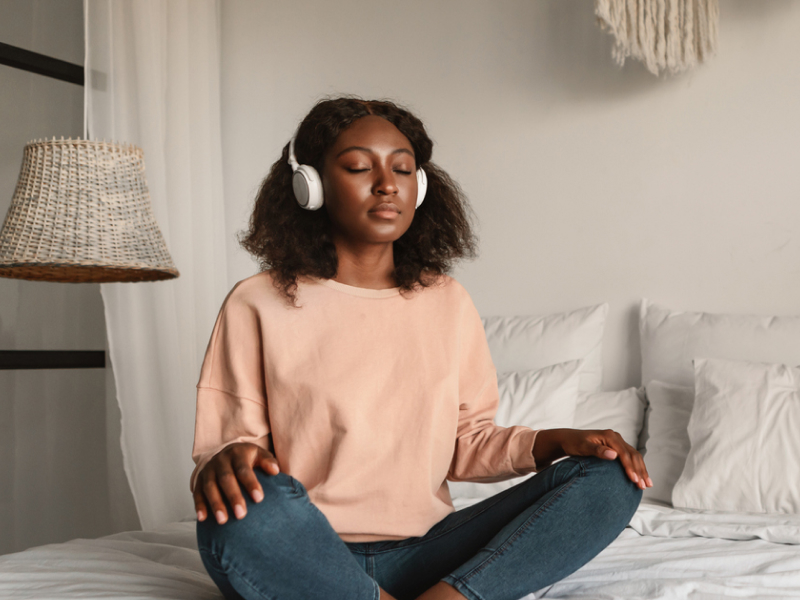
Table of Contents
Here’s How Meditation Can Improve Depression
Written By: Charlie Health Editorial Team

Clinically Reviewed By: Dr. Don Gasparini
February 21, 2024
4 min.
Meditation can be a valuable tool for managing depression symptoms like stress, negative thought patterns, and emotional dysregulation.
Learn more about our Clinical Review Process
Table of Contents
Managing depression can be challenging, but practicing mindfulness can offer a powerful tool for coping. In fact, research has highlighted meditation as a valuable tool in depression management, showing meditative practices to improve depressive symptoms.
By providing a holistic approach to mental well-being, meditation targets various underlying mechanisms associated with depression. Below, we will explore how meditation can help with depression management and different types of meditation that offer unique benefits and approaches to support you on your mental health journey.

Learn how to manage depression
Therapy and skill-building groups with people who get it.
How to use meditation for depression symptoms: a step-by-step guide
Here’s a step-by-step guided meditation for depression management:
1. Find a quiet and comfortable space
Choose a quiet environment where you won’t be disturbed, and sit or lie down in a comfortable and relaxed position.
2. Begin with deep breathing
Close your eyes and take several deep breaths. Focus on the sensation of the breath entering and leaving your body. Pay attention to how your body moves with each breath.
3. Body scan
Shift your focus to different parts of your body, starting from your toes and gradually moving up to your head. Notice any tension or discomfort in your body scan and allow it to dissolve with each breath.
4. Mindfulness of thoughts and emotions
Allow your thoughts and emotions to arise without judgment. Observe them with curiosity and detachment instead of getting caught up in them. Remember that thoughts are just thoughts, and feelings are just feelings—they do not define you.
5. Anchor your attention
Choose an anchor for your attention, such as your breath, a mantra, or a specific sensation in your body. Whenever you notice your mind wandering, gently bring your focus back to your chosen anchor.
6. Practice gratitude
Take a few moments to reflect on things you’re grateful for. Cultivating gratitude can help shift your focus away from negative thoughts and emotions.
7. Closing the practice
When you feel ready, slowly bring your attention back to the room, gently open your eyes, and take a moment to acknowledge the benefits of the practice.
How does meditation help with depression?
As mentioned, research has highlighted meditation as a valuable tool in depression management, showing results of improved depressive symptoms. Meditation addresses multiple underlying factors linked to depression, including stress, negative thinking, and emotional instability, offering a comprehensive approach to mental wellness. Below are some ways meditation can help improve depressive symptoms.
Stress reduction
Meditation helps with depression by calming the body’s stress response. It teaches techniques like focusing on the present moment and deep breathing, which reduce stress hormones like cortisol. Over time, this calms the mind and promotes a sense of peace, which can ease depression symptoms linked to stress.
Improved mood
Meditation boosts mood in depression by increasing positive feelings and reducing negative thought spirals. It helps shift brain activity towards happiness and calmness while teaching people to observe their thoughts and emotions without judgment. This shift in mood can help alleviate symptoms of depression and improve overall well-being.
Improved sleep
Depression often disrupts sleep patterns, leading to insomnia or excessive sleeping. Meditation helps improve sleep in people with depression by calming the mind and body. It reduces anxiety and racing thoughts, making falling asleep and staying asleep easier (which is why a meditation practice may also benefit those with anxiety disorders). A meditation practice can lead to better sleep quality and overall well-being for those dealing with depression.
Increased self-awareness
Through meditation, individuals develop a greater awareness of their thoughts, feelings, and behavioral patterns. Increased self-awareness can help recognize negative thinking habits and unhelpful ways of coping that are commonly linked to depression. This awareness allows for more constructive ways of thinking and responding to challenges.

What types of meditation are recommended for depression?
Different types of meditation can target specific aspects of depression, such as stress reduction and emotional regulation. By incorporating a meditation that works for you, people with depression can build a greater sense of connection to themselves. Below are several types of meditation recommended for managing depression.
- Mindfulness meditation
- Loving-kindness meditation
- Body scan meditation
- Breath awareness meditation
- Transcendental meditation
The best type of meditation for depression may vary from person to person. So, exploring different practices and finding what feels right for you is essential. Guided meditation apps provide a valuable tool for exploring meditation practices and breathing exercises for depression management.
While meditation can be a helpful tool for managing depression, it’s important to remember that it may not be sufficient on its own. If you need more support, connect with a mental health professional or explore therapy for depression.

Mental health treatment at Charlie Health
If you or a loved one are struggling with depression, Charlie Health is here to help. Charlie Health’s virtual Intensive Outpatient Program (IOP) provides more than once-weekly mental health treatment for dealing with complex mental health conditions, including depression. Our expert clinicians incorporate evidence-based therapies into individual counseling, family therapy, and group sessions. With treatment, managing your depression is possible. Fill out the form below or give us a call to start healing today.



